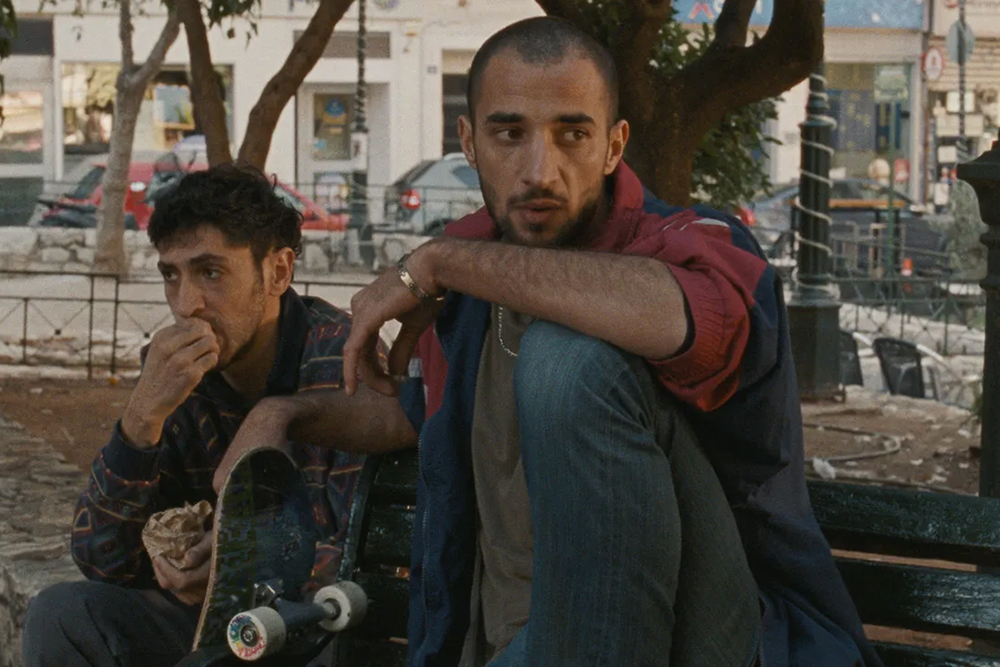Mahdi Fleifel’s debut feature, the documentary “A World Not Ours,” proved to be an unexpected festival hit back in 2012. A warm, often humorous and deeply compassioned study of the Ein El-Helweh Palestinian refugee camp in South Lebanon (where Fleifel was born), and of the frustrations of a stateless generation of young men with no homeland and little prospects except join the growing number of refugees trying to enter Europe, the film won numerous awards around the world. Fleifel has made several short films since “A World Not Ours,” but 12 years on he’s finally back with another feature. “To a Land Unknown” had its premiere in Cannes (as the only Palestinian film in the lineup), but is now set to close the Galway Film Fleadh on July 13, which has made Palestine its country of focus this year. And while it marks Fleifel’s narrative debut, the story of “To a Land Unknown” almost continues on from his award-winning documentary, following two young Palestinian refugees stranded in Athens and desperate to reach Germany. Popular on Variety “The idea for this film really came around 2011 when I went to Athens for the first time to follow my friend who was in ‘A World Not Ours,’” he explains. “But when I arrived there it was like a whole new version of ‘A World Not Ours’ opened up, with these Palestinian refugees, mostly young men who had tried to leave the camps in Lebanon and Syria and make it to Europe.” Fleifel says he was initially inspired by the 1962 novel “Men in the Sun,” in which a group of Palestinian refugees leave their refugee camps to work in Kuwait, but end up stranded in the desert. “And I just thought, Athens is this new urban desert. Nothing has changed,” he said. But as he began formulating the idea, Fleifel became disillusioned, with refugee stories becoming increasingly prevalent on screens (he said it reached a peak around 2016 with the Berlinale-winning “Fire at Sea”). He didn’t want to just join the noise. At one point, he gave up entirely and went off to university to start a course in rhetorical studies (but lasted two months — “I found myself with a load of 20-year-olds and just thought, ‘This isn’t going to work’,” he says). So he picked up the pieces and got back to it. In the end, he shot “To a Land Unknown” on the fly in Greece in November 2023, just six months before its Cannes premiere. While it may have refugees at its main characters, “To a Land Unknown” is far from most recent dramas about immigration. Fleifel wanted to “pay homage” to his favourite cinema, the “early Martin Scorsese” and Brian De Palma 1970s New York films, so crafted a heist thriller set in Greece where the main protagonists aren’t necessarily the good guys. The plot idea actually came from one of the refugees he was initially following in Athens. Fleifel says one of the four he was in touch with made it to Germany, another got to Sweden but went off the radar, while another tragically died of an overdose in Greece. But one landed in London, and when Fleifel asked him how he managed to get there he told him how he’d crossed the border into Macedonia with Euros 20,000 ($22,000) but having left “five men bound and gagged in our basement flat in Athens.” Fleifel was hooked and got him to explain the full story over a weekend. “I was like, oh my god, what is this? Is it ‘Trainspotting’? Is it ‘The Great Escape’?” And so “To a Land Unknown” sees its two lead characters — one of whom has a drug addiction (inspired by his friend who died in Greece) — hatching a plan that sees them posing as smugglers and taking hostages in order to pay for fake passports and get out of Greece. For Fleifel, alongside making a film that is a tribute to his filmmaking heroes and offers he says is a “new angle” to the cinematic refugee story, he also hopes that “To a Land Unknown” makes people connect with Palestinians on a human level, especially given the current news. “The people trying to flee Gaza are like the ones we meet in Athens. All they want is to have a better life and, like us, they have dreams and fears and hopes. But they’re stuck.”

 English
English




